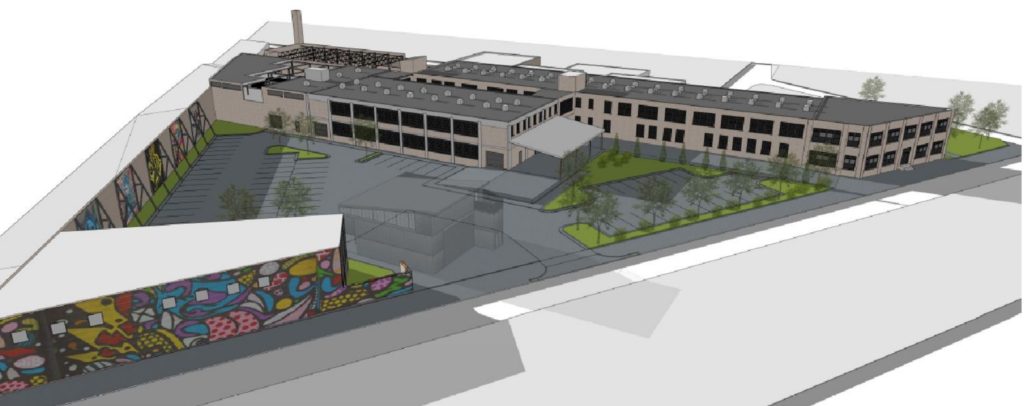$20M project to transform old auto plant + recycling center into affordable make/live artist community from the team behind Recycle Here and Lincoln Street Art Park has been announced to bring make/live space, retail and commercial space and more to historic site. They plan to convert an old auto-plant-turned-recycling- center into a mixed-use, make/live development with affordable housing and 38,000 square feet of retail and commercial space – all the while maintaining the eccentricity that has made it one of the city’s most beloved destinations for not only recyclers, but artists and creatives.
The $20 million project, known as Dreamtroit, will see the former factory and other buildings on its 3.8-acre campus at 1331 Holden St. in Detroit turned into an 81-unit mixed-use development with a market, restaurant and more. The concept is to create a space that is home to cutting-edge art and allows for creatives to gather with a diverse community. Seventeen of the affordable units will be reserved for households at or below 50 percent area median income, 41 units at 80 percent AMI, and the remaining below the workforce housing level of 120 percent AMI.

The apartments will feature 13-foot ceilings, huge industrial windows, flex space, an innovative design to maximize floor space, and come in a variety of loft units, including one-bedrooms, two-bedrooms, studios and studios with communal kitchens. Other amenities will include an indoor event space, a workshop, and a coffee shop, as well as ample on-site parking. The transformation is expected to be completed in early 2022.
Matt Naimi and Oren Goldenberg, were driven to take on the project as a way to protect the arts community that they view as integral to the city’s character. As rents rise across Detroit amid its latest comeback, they saw the options and opportunities for artists to be able to afford to live and create threatened. “We believe it is the people and the culture that push our city into the future,” said Naimi, founder of Recycle Here.
“For the past 12 years, we have been bringing people together through public programming, public space, environmentalism and art. We are ensuring that the working class, artists and innovators will continue to have a home and a platform to build the next generation of Detroit’s cultural and technological revolution, while offering affordable housing to those who make Detroit such a unique and creative place.”
“We believe we should be able to live affordably in the city of Detroit and be entrenched in the amazing culture of our city,” Goldenberg said. “This project is about reimagining old structures in new ways and contributing to Detroit’s reinvention of itself and its icons.” From colorful murals and metal sculpture work to a giant fire-breathing dragon made from reclaimed metal to gatherings of music and art, the Lincoln Street Art Park and the associated artists have become synonymous with creativity in Detroit, as well as environmental stewardship.
The popular Lincoln Street Art Park will continue to play a key role after construction is completed, and will continue to host art and social events. The park was previously an unkempt, underutilized area, but since its creation in 2011, it has become a gathering point for the neighborhood, hosting frequent bonfires, musical performances and other events.
Make Art Work, the nonprofit entity that runs the art park and puts on its programming, will continue to serve that function and also will be in charge of the interactivity and beautification of the entire property as the Dreamtroit project unfolds. Make Art Work is providing a foundation to preserve and grow Detroit as a place for artists to explore the future, create the avant garde, and form a strong, long-lasting community. It provides artist support programs, such as physical space for artists and environmentalists to experiment, take risks, push beyond fears and “share their candy.” “To anyone worried that this will change what can happen here, we are committed to keeping things ‘weird,’” said Goldenberg, who is also a filmmaker. “We have spent countless hours working out how we can maintain the culture that we and Detroit love while still renovating these buildings into a safe, quality place to live and create.”
Situated between the Motown Museum – which is undergoing a $50 million expansion – and the College for Creative Studies, Dreamtroit is within walking distance of the Fisher Building and New Center-area bars, restaurants and more. This makes Dreamtroit and the Northwest Goldberg neighborhood ideally located for creatives. It’s also within walking distance of Wayne State University and the homes and businesses of the popular Woodbridge neighborhood. The site is just 4 miles north of downtown – a 5-minute drive – and just a few blocks southwest of the New Center area, with easy access to the M-10 (Lodge) Freeway and I-94.
As part of the redevelopment, Recycle Here!, Detroit’s destination for recycling for 15 years, has been moved to the Lincoln Street side of the property. In addition to an improved facility, the new drop-off center has new programming and educational opportunities to continue to provide a one-of-a-kind, Detroit-style recycling program.
In late February, the Detroit Housing for the Future Fund (DHFF) closed on $2.26 million in financing commitments for the Dreamtroit project. The DHFF, an investment fund aimed at directing $75 million in capital to affordable housing in Detroit, launched in October with an initial capitalization of $48 million, anchored by a $15 million commitment from JPMorgan Chase and a $10 million guarantee from The Kresge Foundation. DHFF is managed by LISC Detroit and part of the larger Affordable Housing Leverage Fund, which is a partnership with the City of Detroit’s Housing & Revitalization Department. Dreamtroit is the third project to be announced since the fund’s launch last fall.
“Creating housing affordability for all in Detroit is foundational to ensuring safe, healthy places to thrive and grow,” said Tahirih Ziegler, LISC Midwest program vice president. “The Dreamtroit project will create quality, affordable housing for artists and others, continuing the city’s role of being a home for visionary creatives. We are proud to support them in their mission.” Added Julie Schneider, interim director of the City of Detroit’s Housing & Revitalization Department: “The DHFF increases our ability to include deeply affordable housing units in developments that wouldn’t otherwise qualify for traditional financing mechanisms for affordable housing. That makes the DHFF an important tool in our continuing efforts to create more affordable housing in neighborhoods across the city.”
The funding for this deal involved a number of financial partners, including Invest Detroit, Capital Impact Partners, IFF, Michigan Economic Development Corp., and historic tax credits tied to the building’s importance to Motor City history. “Dreamtroit touches on many ideals of Invest Detroit’s mission,” said Mike Vieregge, senior vice president of lending at Invest Detroit. “It repurposes a historic, vacant building, offers significant affordable housing, has a positive environmental impact as the city’s only recycling center, and supports Detroit’s artist community. We are thrilled to help this dream project come to life.”
The property was built in 1908 for the Warren Motor Car Co., but was soon taken over by automaker Henry Leland and served as the first Lincoln Motor Factory in 1917. After Ford Motor Co. bought out Leland in 1921, the facility on Holden began producing Model Ts. It continued to serve as a manufacturing site, from auto parts to refrigerators, for several decades. Later in its life, it served as a food distribution warehouse and distribution center. It has been in Naimi’s family since 1981, and Naimi turned it into Recycle Here in 2007. The complex was added to the National Register of Historic Places in January.
Recycle Here’s founders had traditional waste-reduction and environmental concerns in mind at the time of the program’s founding. The city of Detroit was, at that time, the largest city in North America without a recycling program. However, thanks to the influence of the art community, the main location has grown into a community gathering place.
In 2010, Green Living Science (501c3) was created by the staff at Recycle Here to engage with the youth in Detroit to create systemic change in the waste stream by providing students in the Detroit Public Schools with environmental education. In 2017, Life is a Dreamtroit LLC was formed to take ownership of the complex, and has been working diligently to ensure the site’s future as a cultural destination and safe space for artists and community members, as well as redeveloping the property with the affordable make/live units and an expanded Art Park. Life is a Dreamtroit LLC is a partnership between Naimi and Goldenberg.
Dreamtroit also will serve as a test site for the City of Detroit’s 24-hour Economy Initiative, which brings together city government, nighttime business and the public to ensure Detroit remains a welcoming and supportive place for creatives – especially as development changes neighborhoods across the city’s 139 square miles. Dreamtroit will help broaden programming and activities that cater to a wide range of Detroiters, day and night.
The post Dreamtroit to Transform Lincoln Street Art Park + Recycle Here Creating Affordable Live/Make Artist Community appeared first on PLAYGROUND DETROIT.
